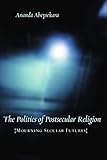The Politics of Postsecular Religion : Mourning Secular Futures / Ananda Abeysekara.
Material type: TextSeries: Insurrections: Critical Studies in Religion, Politics, and CulturePublisher: New York, NY : Columbia University Press, [2008]Copyright date: ©2008Description: 1 online resource (324 p.)Content type:
TextSeries: Insurrections: Critical Studies in Religion, Politics, and CulturePublisher: New York, NY : Columbia University Press, [2008]Copyright date: ©2008Description: 1 online resource (324 p.)Content type: - 9780231142908
- 9780231512671
- 201.72
- BL51 .A33 2008
- online - DeGruyter
- Issued also in print.
| Item type | Current library | Call number | URL | Status | Notes | Barcode | |
|---|---|---|---|---|---|---|---|
 eBook
eBook
|
Biblioteca "Angelicum" Pont. Univ. S.Tommaso d'Aquino Nuvola online | online - DeGruyter (Browse shelf(Opens below)) | Online access | Not for loan (Accesso limitato) | Accesso per gli utenti autorizzati / Access for authorized users | (dgr)9780231512671 |
Frontmatter -- Contents -- Acknowledgments -- 1. Thinking the Un-improvable, Thinking the Un-inheritable -- 2. Aporias of Secularism -- 3. Postcolonial Community or Democratic Responsibility? A Problem of Inheritance -- 4. Toward Mourning Political Sovereignty: A Politics "Between a No-Longer and a Not-Yet"? -- 5. Im-passable Limits of Fugitive Politics: Identity for and Against Itself -- 6. Active Forgetting of History, the "Im-possibility" of Justice -- 7. Politics of "Postsecular" Ethics, Futures of Anti-genealogy: Community Without Community? -- Notes -- Index
restricted access online access with authorization star
http://purl.org/coar/access_right/c_16ec
Ananda Abeysekara contends that democracy, along with its cherished secular norms, is founded on the idea of a promise deferred to the future. Rooted in democracy's messianic promise is the belief that religiouspolitical identity-such as Buddhist, Hindu, Sinhalese, Christian, Muslim, or Tamilcan be critiqued, neutralized, improved, and changed, even while remaining inseparable from the genocide of the past. This facile belief, he argues, is precisely what distracts us from challenging the violence inherent in postcolonial political sovereignty. At the same time, we cannot simply dismiss the democratic concept, since it permeates so deeply through our modernist, capitalist, and humanist selves. In The Politics of Postsecular Religion, Abeysekara invites us to reconsider our ethical-political legacies, to look at them not as problems, but as aporias, in the Derridean sense-that is, as contradictions or impasses incapable of resolution. Disciplinary theorizing in religion and politics, he argues, is unable to identify the aporias of our postcolonial modernity. The aporetic legacies, which are like specters that cannot be wished away, demand a new kind of thinking. It is this thinking that Abeysekara calls mourning and un-inheriting. Un-inheriting is a way of meditating on history that both avoids the simple binary of remembering and forgetting and provides an original perspective on heritage, memory, and time. Abeysekara situates aporias in the settings and cultures of the United States, France, England, Sri Lanka, India, and Tibet. In presenting concrete examples of religion in public life, he questions the task of refashioning the aporetic premises of liberalism and secularism. Through close readings of Nietzsche, Heidegger, Arendt, Derrida, Butler, and Agamben, as well as Foucault, Asad, Chakrabarty, Balibar, and Zizek, he offers readers a way to think about the futures of postsecular politics that is both dynamic and creative.
Issued also in print.
Mode of access: Internet via World Wide Web.
In English.
Description based on online resource; title from PDF title page (publisher's Web site, viewed 02. Mrz 2022)


